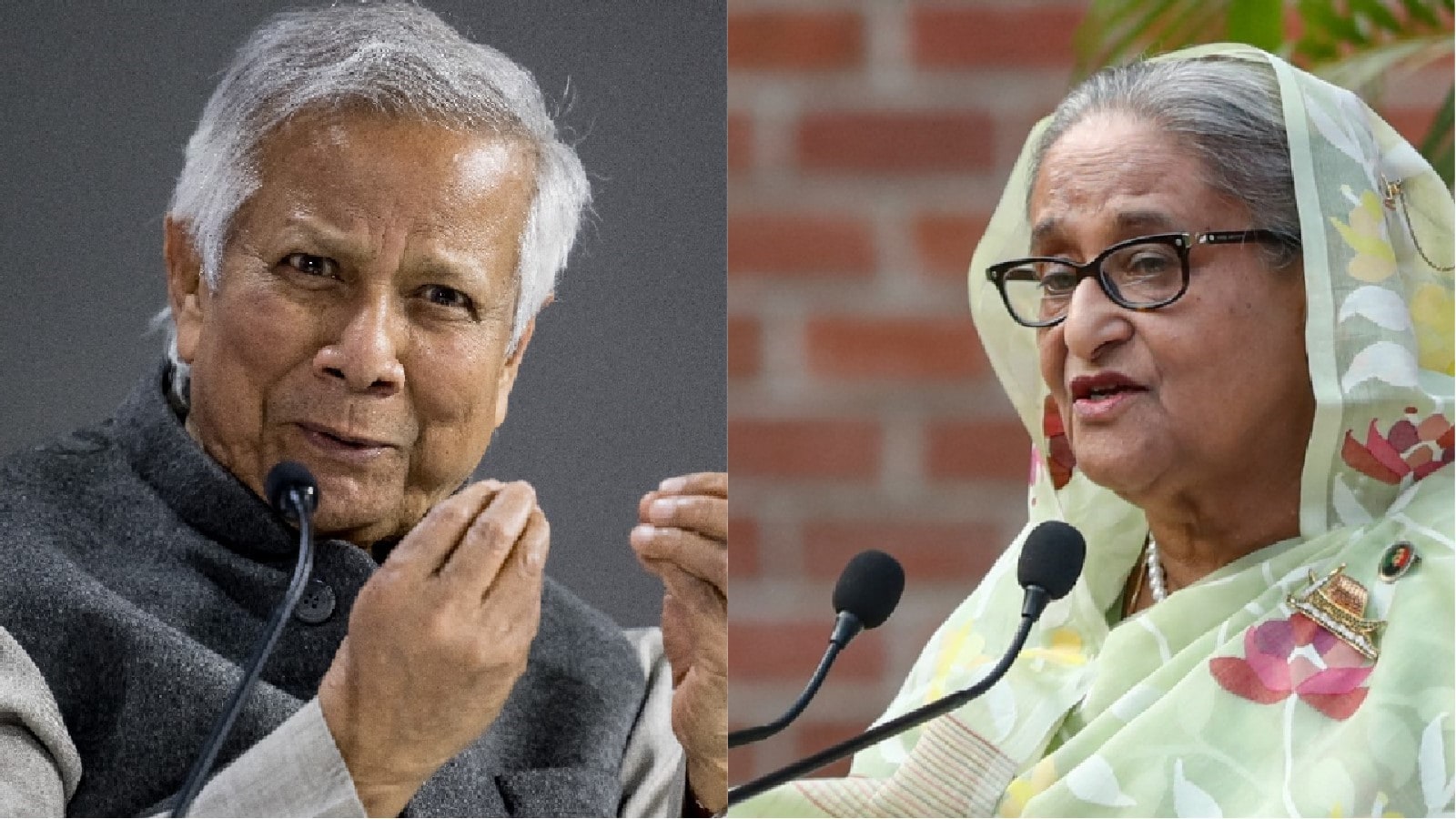Lib Dems denounce new Reform UK chair as 'Trump sycophant'
The Liberal Democrats have criticised Nigel Farage for appointing someone they describe as a Trump sycophant as Reform UK chair.
In a statement about the appointment of David Bull (see 11.55am), Daisy Cooper, the Lib Dem deputy leader, said:
The conveyor belt of Trump sycophants appointed by Nigel Farage rolls on.
Reform is more interested in advancing Donald Trump’s agenda over here, not standing up for the communities that they are supposed to represent.
This elevation of yet another Trump lapdog is just further evidence of this.
To justify their comment, the Lib Dems highlighted this tweet from Bull celebrating Trump’s election victory last year, and another showing that, as a Talk TV presenter, Bull once went on air with a bandage over his ear show he could show “solidarity” with Trump after the assassination attempt.
With Labour reluctant to criticise President Trump because they have to negotiate with him, and the Tories reluctant to criticise him because they admire him, the Liberal Democrats are the biggest party in the Commons with ample scope for Trump-bashing, and they rarely miss a chance indulge.
Key events Show key events only Please turn on JavaScript to use this feature
Farage says having David Bull, qualified doctor, as Reform UK chair will help party counter Labour claims about its health plans
Labour has attacked the new Reform UK chair, David Bull, over his previous comments about the NHS. (See 2.31pm.) But, at his press conference this morning, Nigel Farage said that the fact that Bull worked as a hospital doctor before transferring to a career in TV would help the party. Farage said:
Who knows? Having somebody inside that’s been a hospital doctor might actually be a very useful thing when it comes to answering questions about the Health Service and the deficiencies within it, without people screaming that we want to make people pay £150,000 pounds for a hip operation, which appears to be what the Labour lie machine is roughly saying at the moment.
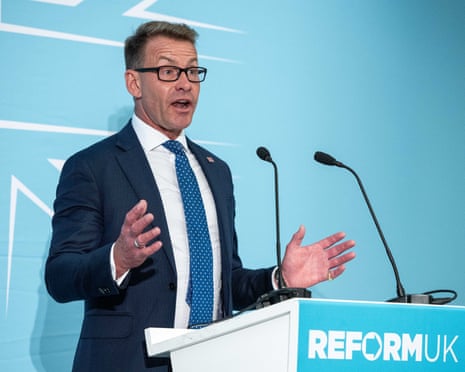
Australia, Canada, New Zealand and Norway join UK in sanctioning two far-right Israeli ministers
This morning Keir Starmer said that he wanted to take action against Israel alongside other allies. (See 2.12pm.) It is now clear what he was talking about, because David Lammy, the foreign secretary, has issued a joint statement with his counterparts from Australia, Canada, New Zealand and Norway explaining why the two ministers should be sanctioned.
In their statement the five foreign ministers say:
Today, the foreign ministers of Australia, Canada, New Zealand, Norway and the United Kingdom have announced sanctions and other measures targeting Itamar Ben-Gvir and Bezalel Smotrich for inciting violence against Palestinians in the West Bank.
Settler violence is incited by extremist rhetoric which calls for Palestinians to be driven from their homes, encourages violence and human rights abuses and fundamentally rejects the two-state solution. Settler violence has led to the deaths of Palestinian civilians and the displacement of whole communities.
We are steadfastly committed to the two-state solution which is the only way to guarantee security and dignity for Israelis and Palestinians and ensure long term stability in the region, but it is imperilled by extremist settler violence and settlement expansion.
Itamar Ben-Gvir and Bezalel Smotrich have incited extremist violence and serious abuses of Palestinian human rights. Extremist rhetoric advocating the forced displacement of Palestinians and the creation of new Israeli settlements is appalling and dangerous. These actions are not acceptable. We have engaged the Israeli government on this issue extensively, yet violent perpetrators continue to act with encouragement and impunity. This is why we have taken this action now – to hold those responsible to account. The Israeli government must uphold its obligations under international law and we call on it to take meaningful action to end extremist, violent and expansionist rhetoric.
Lib Dems back government's decision to sanction two far-right Israeli ministers, while Tories equivocate
Ed Davey, the Lib Dem leader, has welcomed the government’s decision the two far-right Israeli ministers, Itamar Ben-Gvir and Bezalel Smotrich.
Davey said:
I’m relieved to see the government finally sanction the extremist ministers Ben-Gvir and Smotrich. Their calls for the forced displacement and dispossession of Palestinians are utterly abhorrent, and it’s right that they will now face consequences.
Liberal Democrats have been calling for these sanctions since last February. It’s disappointing that the Conservative government refused and Labour took so long to act.
The antidote to the extremism of ministers like Ben-Gvir and Smotrich must be to officially recognise the independent state of Palestine. The Government should take this vital step at next week’s summit - rejecting extremism, demonstrating the UK’s commitment to self-determination, and giving both Israelis and Palestinians hope of a lasting peace.
Priti Patel, the shadow foreign secretary, has also issued a statement about the government’s move. With Kemi Badenoch as leader, and Patel doing foreign affairs, the Conservatives have been almost unequivocally pro-Israel, and this statement is non-committal. It could be read as either supporting the sanctioning decision or opposing it.
We have been clear that the British government must leverage its influence at every opportunity to ensure the remaining hostages are released, that aid continues to reach those who need it, and a sustainable end to the conflict is achieved.
The Conservative party has always been committed to supporting a two-state solution – delivered in the right way, and at the right time – and will work with the government to support efforts to achieve this, where those efforts are effective.
Labour says new Reform UK backs replacing NHS with insurance-based healthcare model
Labour says the new Reform UK chair, David Bull, favours replacing the NHS with an insurance-based healthcare system.
In a statement issued after Bull was announced as the replacedment for Zia Yusuf, a Labour spokesperson said:
While the faces change at the top of Reform UK, the commitment to end the NHS as we know it stays the same.
David Bull has parroted Nigel Farage’s plan for an insurance-based healthcare model which would leave working people paying thousands for routine healthcare treatment.
The threat for patients is crystal clear given Farage said he would stop taxation paying for the NHS and Reform MPs voted in parliament to scrap the means of paying for Labour’s additional investment in the NHS, which is bringing down waiting lists.
Labour said that in May 2025, on the BBC’s local election results programme, Bull said:
Nigel [Farage] has talked about looking at insurance-based systems, he’s talked about looking at countries like Australia, for example, Canada, for example.
Labour says Bull was referring to Farage telling Sky News earlier in the week that he did not want the NHS to be paid for out of general taxation.
Starmer says he hopes other allies will join UK in action tightening pressure on Israel
Keir Starmer has said that he is strongly in favour of acting with other countries in tightening pressure on Israel to change its policy in Gaza.
This morning he recorded an interview with Beth Rigby from Sky News, and Rigby said that, although he kept saying the situation in Gaza was “intolerable”, the government was refusing to act. She asked why the government was not taking action, like sanctioning ministers or suspending further arms sales.
Starmer replied:
Well, it is intolerable and it’s getting worse. And I think anybody looking at what’s going on in Gaza, would be shocked, and that’s why we do need to get back to a ceasefire, urgently. It’s why we need to get the remaining hostages out, they’ve been there a very long time. And of course, humanitarian aid needs to get in at volume and at speed.
We are, in answer to your question, talking to other partners about what more we could do, including questions of sanctions.
My strong belief is, when we make a move, if we’re able to do that in company of other countries, that’s a stronger move than doing it on our own. So that’s the basic approach that we’re taking.
But we are working on what more we could do in a pretty short term now.
It is not clear whether Starmer’s reference to action coming soon was just a reference to the sanctions announcement (see 2pm), which was made public about two hours later, or whether further action, with allies, is planned.
MPs to hear Commons statement later after UK sanctions two Israeli government ministers
Two Israeli government ministers, Itamar Ben-Gvir and Bezalel Smotrich, have been sanctioned by the UK, PA Media reports. PA says:
Ben-Gvir, the security minister, and Smotrich, the finance minister in Benjamin Netanyahu’s coalition government will both face a travel ban and see their assets frozen.
The move comes as the UK and other Western nations seek to ramp up pressure on Israel’s government amid the ongoing war in Gaza.
Israel’s foreign affairs minister Gideon Sa’ar said it was “outrageous that elected representatives and members of the government are subjected to these kind of measures”.
Smotrich and Ben-Gvir both belong to right wing parties which help to prop up Mr Netanyahu’s fragile coalition government.
Both have been criticised for their hardline stance on the war in Gaza.
Smotrich has campaigned against allowing aid into Gaza, while Ben-Gvir has called for Gaza’s people to be resettled from the territory.
In the Commons Lindsay Hoyle, the Speaker, told MPs that a minister will make a statement on this in the chamber later today.
Starmer says spending review decisions will make people 'more safe', despite police claims to the contrary
Keir Starmer has rejected claims that the settlement for the police in the spending review being announced tomorrow will make people less safe.
This is a claim that senior police officers have been making. Last week it was reported that Sir Mark Rowley, the Met police commissioner, and other senior officers sent a letter to Starmer saying the spending offer being planned would have “far-reaching consequences” for the police (negative ones, obviously). And in an article in the Telegraph yesterday, the Police Superintendents’s Association and the Police Federation of England and Wales delivered a similar warning.
But, asked if people would be “less safe” after the spending review, Starmer told GB News:
No, we will be more safe. There’s money going into policing, into security, and that is really important, particularly coming from my background.
I was chief prosecutor for five years, prosecuting cases across England and Wales. So this is a core belief of mine. Those extra police officers will be neighbourhood police officers. And I think that will give people the reassurance in their communities that they are safe and security as individuals, as families, as communities.
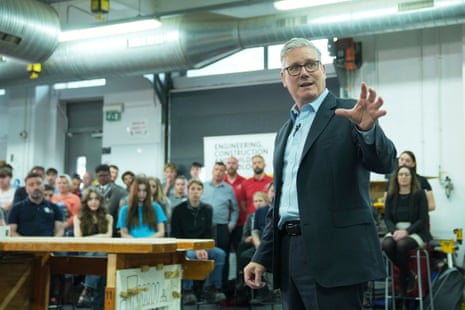
Starmer says Farage 'looking backwards' on energy policy by floating prospect of reopening mines in Wales
Keir Starmer has accused Reform UK of “looking backwards” on energy policy.
In a speech yesterday Nigel Farage, the Reform leader, floated the idea of opening new mines in south Wales if Reform were to take power in Cardiff after the Senedd elections next year.
In an interview with GB News, asked if he would block a Reform-led Welsh government from opening new coal mines, Starmer replied:
I want to go forward, not backwards. And Nigel Farage is going backwards.
The future is in renewables, in clean power, where we have complete control over our energy.
Starmer went on to say he was “really pleased” about today’s Sizewell C nuclear power station announcement.
Asked again if he would block a Reform-led administration reviving the coal industry in south Wales, Starmer replied:
[Farage is] looking backwards and we look forward.
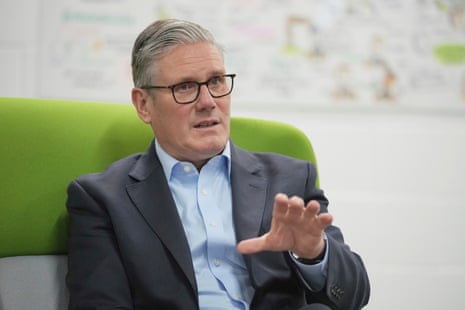
Miliband accuses Green co-leader Adrian Ramsay of having 'none of the above' stance on clean energy measures
In the Commons Adrian Ramsay, the Green party’s co-leader, asked for an assurance that energy customers would not have to pay more through their bills to fund the construction of Sizewell C. He said it would take at least a decade, and could be almost two decades, before it produced any new electricity.
In reponse, Miliband said that under the RAB funding model for nuclear power bill payers would play a role.
He went on to say that Ramsay seemed to be opposing many forms of clean power.
He opposes transmission infrastructure for offshore wind and solar. He opposes solar farms. He opposes CCS (carbon capture and storage). I guess he opposes nuclear. I have an all of the above on clean energy. He has a none of the above position.
Miliband accuses SNP of 'sticking their heads in sand' with their opposition to new nuclear power stations
In the Commons Kirsty Blackman (SNP) complained that the government was spending £14bn on a nuclear power station in England, as well as £22bn on carbon capture and storage projects in England, but without investing in Scotland’s Acorn carbon capture and storage scheme.
In response, Ed Miliband, the energy secretary, said he was in favour of Acorn. And he said he hoped, from the tone of Blackman’s question, that there was “an SNP change of position” coming.
The SNP should rethink their opposition to building new nuclear power stations, he said. The SNP were “absolutely sticking their heads in the sand” on this issue, he said, because nuclear was a means of delivering clean energy, he said.
At his press conference earlier Nigel Farage, the Reform UK leader, was asked if his party backed investment in a new, Sizewell C nuclear power station.
Farage said that he accepted that, if government wants to reduce carbon emissions, nuclear power was “the only way, frankly, to do it”. But he said he thought the model of reactor being used at Sizewell was “outdated”. And he said other countries could deliver nuclear power at a half, or even a third, of the price at which it happens in the UK. He said he would be saying more about this over the next week.
Miliband dismisses Tory claim last government's nuclear power plans more ambitious
In the Commons Ed Miliband, the energy secretary, has delivered his opening statement setting out the three related nuclear energy announcments from the government today. (See 12.40pm.)
Nick Timothy was responding from the front bench on behalf of the Conservative party. He said the Tories were pro-nuclear power. But he said the coalition government was not able to make progress commissioning new nuclear power stations because the Liberal Democrats ruled this out in the coalition agreement.
He also claimed that the last Conservative government had paved the way for the announcement today with decisions it had taken.
UPDATE: Timothy said:
This statement is a downgrade on what the last government put in motion. Today, the energy secretary has announced only one small modular reactor (SMR). There is no clear target to increase nuclear power generation, and no news on Wylfa.
The nuclear industry is expecting news of a third gigawatt-scale reactor. The last government purchased the land and committed to build but on this today, the energy secretary said nothing.
So can he commit to the planning inherited for a third gigawatt-scale plant at Wylfa? And will he recommit to the Conservative policy of 24 gigawatts of nuclear power by 2050?
And Miliband replied:
I do sort of slightly scratch my head, because he sort of says it’s a downgrade, I mean, we’ve announced the largest nuclear building programme in 50 years.
It might have sort of looked good in the mirror this morning, but I think it … sort of doesn’t really bear much resemblance to reality.
Lib Dems denounce new Reform UK chair as 'Trump sycophant'
The Liberal Democrats have criticised Nigel Farage for appointing someone they describe as a Trump sycophant as Reform UK chair.
In a statement about the appointment of David Bull (see 11.55am), Daisy Cooper, the Lib Dem deputy leader, said:
The conveyor belt of Trump sycophants appointed by Nigel Farage rolls on.
Reform is more interested in advancing Donald Trump’s agenda over here, not standing up for the communities that they are supposed to represent.
This elevation of yet another Trump lapdog is just further evidence of this.
To justify their comment, the Lib Dems highlighted this tweet from Bull celebrating Trump’s election victory last year, and another showing that, as a Talk TV presenter, Bull once went on air with a bandage over his ear show he could show “solidarity” with Trump after the assassination attempt.
With Labour reluctant to criticise President Trump because they have to negotiate with him, and the Tories reluctant to criticise him because they admire him, the Liberal Democrats are the biggest party in the Commons with ample scope for Trump-bashing, and they rarely miss a chance indulge.
3 components of nuclear power investment: Sizewell C, small modular reactors, and fusion energy
In the Commons Ed Miliband, the energy secretary, will shortly be making the nuclear investment announcement.
Although the focus has mostly been on Sizewell C, there are in fact three components to the nuclear energy strategy announced today. The Treasury has set out them all in a news release. This is how it summarises the three linked announcements.
Sizewell C
Sizewell C will provide 10,000 people with employment at peak construction and support thousands more jobs across the UK, including 1,500 apprenticeships …
Despite the UK’s strong nuclear legacy, opening the world’s first commercial nuclear power station in the 1950s, no new nuclear plant has opened in the UK since 1995, with all of the existing fleet except Sizewell B likely to be phased out by the early 2030s.
Sizewell C was one of eight sites identified in 2009 by then-energy secretary Ed Miliband as a potential site for new nuclear. However, the project was not fully funded in the 14 years that followed under subsequent governments.
The government’s nuclear programme is now the most ambitious for a generation - once small modular reactors and Sizewell C come online in the 2030s, combined with Hinkley Point C, this will deliver more new nuclear to grid than over the previous half century combined.
Small modular reactors
The government’s nuclear resurgence will support the UK’s long-term energy security, with small modular reactors expected to power millions of homes with clean energy and help fuel power-hungry industries like AI data centres.
This follows reforms to planning rules announced by the prime minister in February 2025 to make it easier to build nuclear across the country - changing the rules to back the builders of this nation, and saying no to the blockers who have strangled our chances of cheaper energy, growth and jobs for far too long.
The government is also looking to provide a route for private sector-led advanced nuclear projects to be deployed in the UK, alongside investing £300m in developing the world’s first non-Russian supply of the advanced fuels needed to run them.
Fusion energy
The government is also making a record investment in R&D for fusion energy, investing over £2.5 billion over 5 years. This includes progressing the STEP programme (Spherical Tokamak for Energy Production), the world-leading fusion plant in Nottinghamshire, creating thousands of new jobs and with the potential to unlock limitless clean power.
This builds on the UK’s global leadership to turbocharge economic growth in the Oxford-Cambridge corridor, while helping deliver the UK’s flagship programme to design and build a prototype fusion power station on the site of a former coal-fired plant.
Farage says restoring death penalty will become matter for 'major national debate' within next decade - but he is against
Nigel Farage has just finished his press conference. It was his second in two days, and he took a large number of questions. Tim Montgomerie, the journalist who set up ConservativeHome and who is now a Reform UK supporter, says he thinks Farage has taken almost 100 questions from reporters at press events in the last fortnight, far more than any other party leader.
The Q&A covered a lot of topics but what was most interesting was Farage’s repeatedly willingness to float hard right or extreme propositions – while at the same time not quite fully adopting them.
A good example came when he was asked about Reform UK’s position on the death penalty. Farage said that he expected calls for the restoration of the death penalty to become a major political issue over the next decade – while stressing that he was personally opposed. The result was that a hardline GB News viewer keen to see murders hang may have concluded that, under Farage, this would all be getting more likely – while a liberal-minded, Reform-curious former Tory voter watching may have concluded that Farage was reliably moderate on this issue after all.
Asked by a reporter from the Sun what the party’s position on the death penalty was, Farage replied:
These are issues of conscience, just as the assisted dying debate will be when it comes up on Friday, just as the abortion limit. These are all issues of conscience. Nothing on the death penalty will be part of party policy.
I have to say, personally, given there have been 500 quite serious miscarriages of justice in this country since the early 1970s, I don’t think I could ever support it. But I understand why others take a different point of view.
Although I do think it’s quite interesting there’s a younger generation coming through who seem to increasingly support the death penalty. And I suspect it will be back within the next decade as an issue of major national debate. Not quite yut, but it’s coming.
But, certainly, these things will not be party policy, far, far from it.
Farage was referring to this polling from More in Common UK released in January. In a report on what it shows, the Evening Standard said:
A majority of Britons support reinstating the death penalty in the UK, with Millennials showing the strongest support, a poll has found.
Three in five, (58 per cent) of Millennials born between 1981 and 1986, believe capital punishment should be reintroduced.
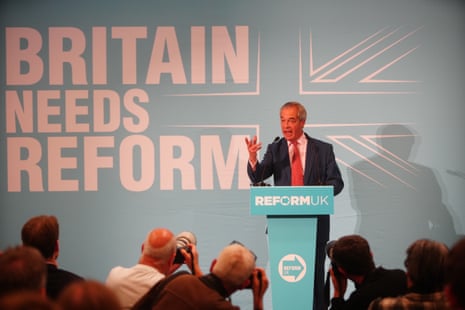
Former TV presenter David Bull confirmed as Reform UK's new chair
David Bull has been confirmed as Reform UK’s new chair, PA Media reports. PA says:
The former television presenter and medical doctor was announced as the party’s chairman at a press conference in Westminster this morning.
His appointment comes after businessman Zia Yusuf resigned from the position last week.
Speaking at the press conference, Yusuf said that he is “hugely excited” that Bull was taking the role.
“I wholeheartedly congratulate him and I know he’s going to do an incredible job for us,” he added.
Nigel Farage said Bull would come to the chairman’s role with “terrific verve, energy, enthusiasm”, adding: “It’s going to be great fun”.
Yusuf returned to Reform over the weekend, just 48 hours after he quit, saying he had made an “error”.
He will lead the party’s plans to cut public spending – the so-called “UK Doge”, based on the US Department of Government Efficiency which was led by tech billionaire Elon Musk.
Yusuf quit as chairman after an internal row in which he described a question asked to the prime minister by the party’s newest MP, Sarah Pochin, about banning the burka as “dumb”.

 1 day ago
1 day ago






